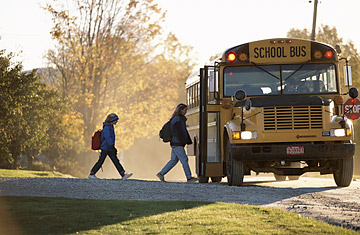
(3 of 3)
'What you'll do next in life'
In mid-January, Christmas decorations still hang on the light posts that line the main street in Cawker City. The two-tenths-of-a-mile-long stretch of road is marked by abandoned storefronts and a gazebo housing America's largest ball of twine.
Seven miles down a mostly empty stretch of one-lane highway, Downs — another tiny town in the Waconda district — has a bit more to offer: a grocery store, a laundromat and a handful of restaurants. The nearest Walmart is a 90-minute drive.
Waconda's small communities — where everyone knows everyone and everything — are what high-school senior Jenny Koops has known all her life. Born and raised in Downs, she's attended Waconda schools since kindergarten. She'll graduate in June and attend BethelUniversity in St. Paul, Minn. to study biology.
Her mother, a nurse, has an associate degree, and her father started college but dropped out. Koops and her three older sisters, two of whom have already earned bachelor's degrees, have always believed they'd get four-year degrees.
"It's kind of like, that's what you'll do next in life. You're going to go to college and you're going to get a degree," she says. "You can go wherever you want, but you were going to go."
Professor Ready, of Columbia's Teachers College, believes this is something the schools can't claim credit for. "The school system is one interconnected cog in the community," he says. "The social capital, the culture, the college-going ethos — that's a community thing, that's not a district thing."
Koops works at her father's combo gas station/hunting store when she's not in school, and takes out-of-town shopping trips with her friends. They are all heavily involved in extracurricular activities, from Future Farmers of America to the school's eight-man football team. On a bulletin board in her high school hang both college test-prep posters and asign that reads "Pregnant? We can help."
Her parents are often too busy to sit down and help with homework. Her father works 14- to 15-hour days, she estimates. Her mother sees patients in four different counties and is almost always on call.
When Koops struggled with trigonometry last year, she met her math teacher nearly every day for 40 minutes before school started. "If my teacher was going to come in before 7:30 — that was pretty awesome to me," she says. "She was going to make sure I could do [the problems]."
Teachers model the work ethic they demand of students. The high-school Spanish teacher also teaches business. The middle-school vocal music teacher works with at-risk seventh- and eighth-graders in English, math and science. An elementary-school secretary does everything from man the library to coordinate the district's bus schedule. Most have taught in the district their entire careers, some for more than three decades. By comparison, 46 percent of new teachers nationally quit within five years.
District officials estimate that about a third ofteachers belong to the Kansas affiliate of the National Education Association, the country's largest teachers union. The starting salary for teachers in Waconda is $27,000, while the highest salary a teacher can earn here is $43,875 — after 20 years on the job and with a graduate degree. Nationally, the average starting teacher salary is $39,000, and veteran teachers in some cities or suburbs can make more than $100,000 a year.
The teachers "want these kids to succeed so badly, and they just really put their whole heart and soul into it," says Weber, Mason's mom. "They just care so much. That's so refreshing as a parent to know that these teachers aren't just in it for a paycheck."
Many teachers say they view themselves and their schools as stabilizing forces in children's lives, particularly at the elementary level. Parental expectations and involvement may be high — the district gets close to100-percent participation at parent-teacher conferences at the elementary-school level — but day-to-day, many students are on their own to do homework.
Sixth-grade teacher Lynn Wacker, for instance, spends time each night responding to the text messages of one student whose motherdoesn't get home from work until after 8 p.m., answering questions about homework.
"We take on the role of parents, not just teachers," Wacker says. "I want to see these kids grow up to be good people, get good jobs."
This combination of knowing students well and a determination to do right by them is what makes all the difference, Wacker says, to the success of the little district on the plains — a place that could provide some national lessons as well.
"I don't know if you can duplicate it," Wacker says. "But [it's] worth trying."
This story was produced by The Hechinger Report, a nonprofit, nonpartisan education-news outlet based at Teachers College, Columbia University.
